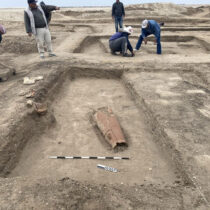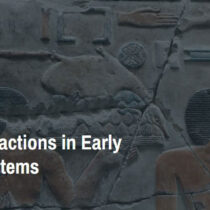In Greek thought the cultivation of cereals is a notion connected with civilized life. Not only were offerings of crops included among the rituals of the cult of Demeter but also rituals for the dead, which, however, belonged to the realm of authority of her daughter Persephone, otherwise known as Kore . The ear of wheat, the torch and the pig were attributes of both deities, who were usually represented together. In this article we will not deal with the interpretations and the semantics of the rituals and the variations of the myth concerning the two goddesses. But we will present certain relevant views which have been overlooked until now; on one hand the idea that in antiquity women were not engaged with agriculture, and on the other the notion that they were excluded from political life. What has sealed modern thought is the model of labour distribution according to sex, a model developed in the fourth century BC by Xenophon in his Oeconomicus. This ideal model, according to which woman is suitable for indoors and man for outdoors labour (7. 35-37), was created in a period, when the institution of the family progressively gained political importance, and, therefore, the relationship of man and woman and man within the home had to be redefined.The two sexes cooperated in ritual boundaries rather than being in opposition to one another . Thus, while the rituals connected with the sowing and preparation of seeds were in the hands of women, those related to the harvest, such as the Dipolia, were under the authority of men. Demeter’s rituals, however, were not exclusively connected with agriculture but also with the social and political structure of the city: The participation of slaves and foreigners in various religious festivals, such as the Panathenaea, indicates that the city was a social scheme incorporating “antagonistic” elements and at the same time part of a network of relations with other cities. Thus, the participation of the entire population in Demeter’s rituals proves that not only inhabitants of the famous city of Attica, men and women, but also slaves and foreigners sent offerings of their crops to Eleusis.
The grain deities, Demeter and Persephone
21 Aug 2012
by Archaeology Newsroom
- A
- A
- A

